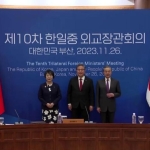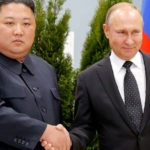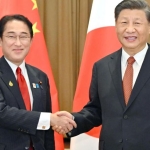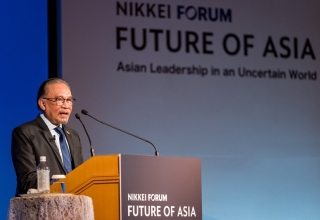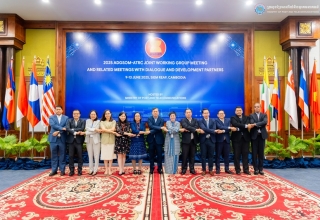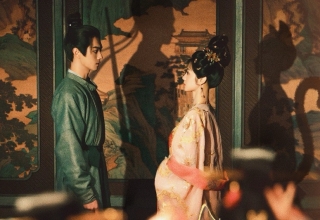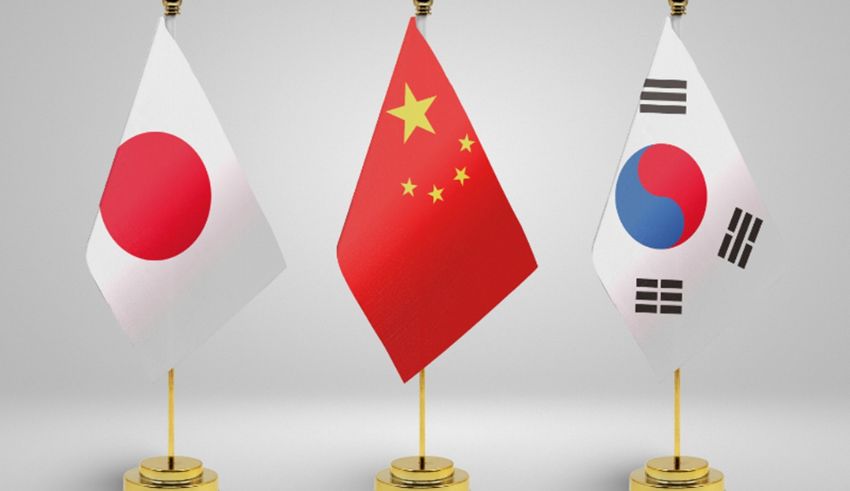
In a surprising twist of diplomatic theatrics, the leaders of China, Japan, and South Korea are tentatively treading towards a summit, possibly unveiling the spectacle next year. This unfolding drama, seeking to soothe regional jitters exacerbated by North Korea’s weapon posturing and an increasingly conspicuous U.S. military choreography, had its prologue in a clandestine meeting between Chinese President Xi Jinping and his U.S. counterpart, Joe Biden, at the Apec summit in California.
The stage for this geopolitical performance was set during a clandestine gathering of the three Asian nations’ foreign ministers in the South Korean port city of Busan. This secretive rendezvous marked the ministers’ first strategic huddle since 2019, provoking whispers about a potential plot twist in the form of the first leaders’ summit in four years.
While the curtain call for this summit isn’t anticipated before the year’s final act, South Korea’s national security adviser, Cho Tae-yong, hinted at a dramatic revelation “in the near future.” The lead-up to this summit mirrors the complex choreography of a geopolitical ballet, with each move carefully calculated to address concerns, especially those shadowed by China’s unease over deepening security alliances between Japan, South Korea, and the U.S.
The Diplomatic Stance?
Amidst the geopolitical dance, the South Korean president, Yoon Suk Yeol, the Japanese prime minister, Fumio Kishida, and the enigmatic Xi Jinping are expected to take center stage. Their anticipated summit, shrouded in mystery, is set against a backdrop of heightened security tensions, symbolic handshakes, and whispered strategic dialogues.
Keep Reading
As diplomatic actors from the three nations pledged to enhance collaboration in critical areas, including security, the narrative unfolded like a well-scripted drama. The plot thickened as the Chinese foreign minister, Wang Yi, urged the trio to reject ideological divisions, echoing a call to resist turning regional cooperation into rigid camps.
The subplot involving North Korea added an element of suspense to the storyline. Days after Pyongyang’s successful launch of a spy satellite, a move challenging UN-led sanctions, the foreign ministers convened to condemn the act. The protagonists pledged a united front against the clandestine dealings funneling North Korean munitions to Russia, adding a layer of intrigue to the geopolitical narrative.
In this intricate geopolitical theatre, historical grievances cast a long shadow. A recent South Korean high court ruling demanding compensation from Japan for wartime atrocities added a layer of complexity to the narrative. The historical legacy, fraught with emotion, reflects the intricate dance between the two nations, each playing their part in this geopolitical ballet.
The grand finale, a summit of leaders, promises a crescendo of diplomatic maneuvers. While uncertainties loom large, and historical echoes reverberate, the diplomatic engagement reflects a unique blend of strategy and choreography in a region grappling with contemporary challenges and echoes of a complex past. As the curtain rises on this geopolitical play, the world watches with bated breath, curious to see if the leaders can navigate the intricacies of their geopolitical ballet and choreograph a harmonious resolution to regional challenges.
